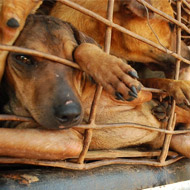
Residents urged to stop eating dogs and cats
The sale of dog meat in the Vietnamese capital Hanoi will be banned from 2021, according to animal welfare charity Soi Dog Foundation.
In a press release, the charity said it was surprised but delighted by the announcement, having worked with at the Hanoi People’s Committee to drive them towards ending the dog meat trade.
“This is wonderful news. We sincerely hope that step by step, this planned ban will be spread out across the entire city and will be emulated by other cities in Vietnam,” said Soi Dog founder, John Dalley. “There is no place for cruelty in culture. Hanoi is growing into a 21st-century city, and practices that belong in the dark ages should be cleared away.”
Hanoi’s animal health director Nguyen Ngoc Son told Lao Dong Newspaper on Wednesday (12 September) that his department is building a plan to gradually phase out the slaughtering and trading of dog meat. “By 2021 there will be no dog meat restaurants in the city centre," he said.
The announcement came just one day after The People’s Committee urged residents to stop eating dogs and cats because of the risk of contracting diseases. The Committee also said that the slaughter and sale of cats and dogs for their meat had damaged the image of Hanoi.
Mr Son also told Lao Dong newspaper that Hanoi currently has more than 1,000 restaurant selling dogs and cat meat. It is not known exactly how many dogs and cats are eaten throughout Vietnam, but it is estimated to be around five million a year.
Soi Dog’s representative in Vietnam, Bao Tran, commented: “This is huge news here. It was the biggest story on all news outlets in Vietnam and seems to be widely supported by people.
“The vital component now is for Hanoi to discuss and create the legal framework for banning the dog and cat meat trade. Soi Dog will be happy to help and guide in any way we can.”
Image (C) Soi Dog



 The Veterinary Medicines Directorate (VMD) is inviting applications from veterinary students to attend a one-week extramural studies (EMS) placement in July 2026.
The Veterinary Medicines Directorate (VMD) is inviting applications from veterinary students to attend a one-week extramural studies (EMS) placement in July 2026.